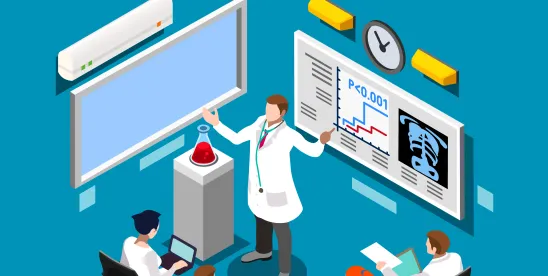This is the fifth edition of our blog series on decentralized clinical trials DCTs. Click here to explore the series.
The COVID-19 Pandemic required the health care industry to adapt to accommodate remote patient care, including for patients involved in clinical trials, and the use of Decentralized Clinical Trials (DCTs) proliferated during the Pandemic. DCTs are clinical trials where some or all trial-related activities occur at non-traditional clinical trial site locations, such as via telemedicine, local health care providers’ (HCPs) facilities, or in a clinical trial participant’s home. While DCTs offer several benefits to the clinical research industry, it is important to know the research misconduct risks associated with DCTs and how best to avoid them. Importantly, the Office of Research Integrity (ORI) recently released a final rule revising regulations governing research misconduct in federally funded research (read the Foley blog summarizing and analyzing the final rule here). These revised regulations directly affect DCTs. Institutions undertaking DCTs should take care to familiarize themselves with the revised regulations.
The Benefits of Decentralized Clinical Trials
DCTs allow a national principal investigator (PI) to contract with sub-investigators across the country, who then connect with local HCPs. The flexibility associated with DCTs allow local HCPs to meet patients where they are, which makes the provision of clinical trial services more efficient and easier to access for participants. HCPs can carry out the DCT’s standard procedures without patients having to travel great distances to a traditional, brick and mortar health care center.
Notably, the U.S. Food & Drug Administration has called for an expansion of diversity in clinical trials, and DCTs assist with the diversifying efforts by expanding access to clinical trials to individuals who may have otherwise been unable to participate due to their physical location.
DCTs are also beneficial when it is difficult to recruit participants. For example, clinical trials for rare diseases often have limited populations of eligible participants due to constraints on finding patients in this small population with the ability to relocate to the clinical trial site. DCTs alleviate this problem because eligible participants with the rare disease are able to participate regardless of location.
For all the benefits associated with DCTs, DCTs also present unique risks for research misconduct. Knowing those risks and ways to avoid them will allow researchers to benefit from DCTs without taking on additional liabilities.
DCTs Present Risks for Research Misconduct
Within the U.S. Department of Health & Human Services, ORI oversees research integrity for research involving Public Health Service (PHS) funding, including oversight of research misconduct investigations.
Research misconduct means the falsification, fabrication, or plagiarism in proposing, performing, or reviewing research or reporting results. Pursuant to federal regulation, recipients of PHS funding must comply with all requirements for addressing research misconduct, listed at 42 C.F.R Part 93, including investigating and reporting instances of research misconduct to ORI. Those found to have committed research misconduct may be subject to administrative actions including suspension or termination of PHS grants, and/or suspension or debarment from participation in certain federal programs.
In addition to administrative penalties, research misconduct may also present risk under the False Claims Act (FCA). The FCA penalizes the submission of false claims for payment to the federal government. Those who violate the FCA may be subject to treble damages plus penalties. Enforcement under the FCA may be brought by the government or a whistle blower, called a qui tam relator, and several recent cases illustrate how research misconduct underlying submissions for federal funding may subject health care institutions to significant exposure.
DCTs present unique risks for research misconduct.
- Data Integrity Concerns. DCTs have more data entry points due to their decentralized nature, including from HCPs located remotely and reporting to sub-investigators who may also be remote from the PI. With each additional data entry point, data falsification and fabrication become a potential issue.
- Challenges with PI Oversight. The decentralized structure of DCTs makes it more difficult for PIs to exercise the level of oversight required under the ORI rules. PIs must oversee sub-investigators and HCPs located remotely, often across the country. PIs must also supervise the remote data entry and data collection practices. When the data comes in, PIs currently lack a verification process for the work that is being done by sub-investigators and HCPs located anywhere in the country.
- Data Coming From Multiple Sources. Difficulties arise when PIs must obtain data from multiple sources. This problem already exists in academia, where data is often not created and collected by a singular institution. When multiple institutions are working on a trial, there is no good way for the academics to verify the other institution’s work product. The same challenge exists for DCTs, and DCTs present additional challenges because data may be coming from less sophisticated sources.
The recently revised regulations indicate that ORI is taking steps to modernize the regulations to address the complexities of modern-day research, including complexities present in DCTs. In particular, the recently revised regulations state that in allegations involving multiple institutions, one institution must be designated the lead institution. The lead institution is responsible for obtaining research records and witness testimony from other institutions. Additionally, in its proposed rule, ORI would have required institutions to consider whether additional researchers are involved in the alleged misconduct. ORI dropped this mandatory language in the final rule, and instead revised the regulations to state that research institutions may exercise their discretion in deciding whether to consider if other researchers are implicated.
How to Avoid the Risks
While DCTs pose their own unique research misconduct risks, PIs can avoid the risks by implementing several safeguards.
- The importance of smart hiring cannot be overstated. PIs must hire sub-investigators that can be trusted, given the decentralized work structure. PIs must entrust their sub-investigators to oversee HCPs responsible for patient care.
- DCTs should incentivize accuracy in data collection and data management practices. For example, DCTs should not compensate HCPs for data quantity due to concerns of incentivizing sheer data volume over accuracy.
- Development of a notebook monitoring system allows for monitoring to be tailored to the research protocol and facilitates an easier review process for PIs.
PIs should consider structuring research protocols or drafting grant applications to include these safeguards. In fact, these may help to strengthen grant applications by demonstrating a proactive approach to avoiding and mitigating research misconduct risks.
DCTs expand clinical research access to trial participants nationally. To continue to benefit from DCTs, researchers must actively implement safeguards to prevent research misconduct risks in current and future DCTs. Researchers are encouraged to incorporate these safeguards when conducting DCTs and to stay attuned for developments as the federal government’s oversight of research misconduct advances with changes in the industry.
DCT Series
For additional resources on how decentralized clinical trials will impact the world of health care and life sciences, click here to read the other articles in our series.







 />i
/>i

